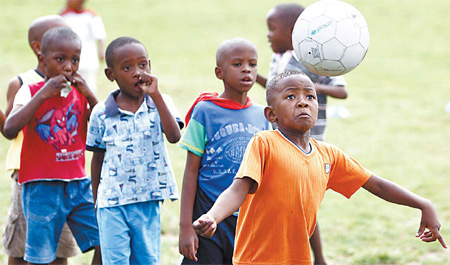Football power to fight against AIDS
ALEXANDRA, South Africa: On a dusty sports field in Alexandra township more than a hundred excited children laugh and shout as they kick around footballs, sing and play games that teach them about the dangers of AIDS.
The boys and girls, ranging from tiny tots in oversize shorts to hefty teenagers, belong to one of the many projects all over the world that are using the huge power of football to help underprivileged children overcome social problems.
 A boy heads a ball during the Play Soccer program at the Football for Hope festival site in Alexandra, South Africa. Soccer's ruling body FIFA will use next year's World Cup to promote projects all over the world that are using the power of football to help underprivileged children overcome social problems through a Football for Hope festival alongside the soccer extravaganza. [Agencies] |
Soccer's ruling body will use next year's World Cup for the first time to promote these projects through a "Football for Hope" festival running alongside the soccer extravaganza, which attracts the world's biggest cumulative television audience.
FIFA has combined with the global NGO streetfootballworld to create Football for Hope and the kids in the sprawling Johannesburg township of Alexandra belong to one of its members, Play Soccer, which trains hundreds of children twice a week.
The Football for Hope festival will take place in the second half of the month-long World Cup, which starts next June 11.
Some 32 organizations from around the world - the same number of nations as in the World Cup - have been chosen to take part, based not on their football prowess but on the success of projects to address social issues like homelessness in London, landmines in Cambodia, gang violence in Colombia and South Africa's scourge of AIDS.
"The idea is we show the power of soccer to achieve social change, while the eyes of the world are on South Africa," said Football for Hope Communications Manager Mike Geddes.
Piggy backing on enthusiasm
Geddes and Play Soccer's South Africa director, Sibu Sibaka, make no bones about the strategy of enticing children in with football, the world's most popular game, and then using their enthusiasm to teach vital survival skills.
"Football is not just nice for the kids, but crucial," Geddes said.
The Football for Hope movement "uses football to teach kids life skills. It could be anything from why it is important to brush your teeth to safe sex and avoiding HIV and AIDS," he added. "It uses the fact that kids are motivated, engaged and inspired by the power of football to teach them these very important education messages."
And the kids are certainly not objecting, clearly enjoying the health and social lessons as well as the football, taught by young volunteers from Alexandra.
Everybody is aware of the benefits of getting young people off the mean streets of Alexandra, in a country with one of the world's highest rates of murder and rape.
"If you don't play sports, what future will you have? If you don't play sports you will kill people and steal," said 12-year-old Itumeleng Tsotetsi in a break from soccer drills.
Learning to play safe
One of the games played in South Africa is called Risk Field. Children dribble between cones representing risks like unsafe sex or multiple partners. If a player hits a cone he or she has to do press ups and if it happens again the whole team has to join in.
"This teaches them that their actions have consequences not just for them but for other people. Using these games really brings it alive for these children and makes the education messages that much stronger," Geddes said.
On the Alexandra field, games include running around cones to pick up pieces of paper with names of nutritional foods and bad habits. Alcohol scores minus 5, vegetables plus 5.
"Children have an opportunity now to come down and get involved in the program instead of having a lot of time to do other things that may not be right," said Sikhumbuzo Mnculwane, a community relations officer with Football for Hope.
Sibaca said that although it was difficult to quantify how much the program had weaned children away from crime, many of the players came from troubled homes.
"These kids will play soccer until there is no light on the streets and we figure let's provide a safe environment for them to do exactly that but teach them a thing or two in the process that will help them for life," she said.
Reuters





















